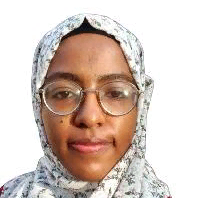
Ethar A. Awad
Work place: Biomedical Engineering Department, College of Engineering, Sudan University of Science and Technology, Khartoum, 11111, Sudan
E-mail: etharhope@gmail.com
Website: https://orcid.org/0000-0003-1136-9746
Research Interests: Medical Informatics, Artificial Intelligence
Biography
Ethar A. Awad earned her B.Sc. of Engineering in Biomedical Engineering from the Sudan University of Science and Technology (SUST) in 2020. She is a Co-Supervisor & Research Assistant in the department of Biomedical Engineering at (SUST). In addition, she works as a Biomedical Engineer at the Health Insurance Authority – Presidency in Khartoum, Sudan. In 2021, she worked as a Teaching Assistant at SUST. She worked as an intern Biomedical Engineer at National Medical Supplies and a Turkish hospital in Khartoum, Sudan. She published her first paper, A Computer-Aided Diagnoses Program for Leukemia Detection Using Blood Samples (Khartoum, Sudan, Journal of Clinical Engineering 2020). Her research interests include artificial organs design, and a biomedical artificial intelligence. She worked on similar projects and research. Eng.Abdalmonem participated in the Stars of Science and Falling Walls Lab competitions, and Expo Dubai 2020 with this proposed project.
Author Articles
An Innovative Leukemia Detection System using Blood Samples via a Microscopic Accessory
By Azza M. Bin Aof Ethar A. Awad Sarah R. Omer Banazier A. Ibraheem Zeinab A. Mustafa
DOI: https://doi.org/10.5815/ijem.2023.01.03, Pub. Date: 8 Feb. 2023
Leukemic patients are in a rapid increase. Hence, the use of microscopic images of blood samples through visual inspection to identify blood disorders has increased, opening the door for computerized techniques for detecting leukemia. This project applies computer vision techniques to increase the accuracy and speed of detection from periph-eral blood. It also enhances visualization by providing an appropriate supplement to traditional microscopy. A micro-computer (Raspberry Pi) was well programmed in Python for analyzing images with the help of a Raspberry Pi camera and a touch screen as an alternative to the eyepiece. To achieve diversity and seek for more accuracy, image datasets for this project were obtained from various resources. These datasets were then analyzed through image processing techniques to detect leukemia cells. This detection process involves resizing cells to a standard size, noise removal by linear scaling filter, global-local contrast enhancement, segmentation of white blood cells (WBCs) using marker-controlled watershed algorithm, overlapping detection and separation using watershed and k-means clustering algorithms, and extraction with selection of the most relevant features from cells. These features were then imported into the Support Vector Machine (SVM) model which resulted in an accuracy of 93.2773%. A standalone desktop application with a suitable graphical user interface (GUI) was implemented. It was then uploaded into the Raspberry Pi, some code lines were rewritten for dealing with the camera, the hardware was designed and implemented, and then formal experiments were conducted resulting in the detection of leukemia in 5 samples out of 6. This implies that precise detection can be implemented with different data taken in various imaging conditions.
[...] Read more.Other Articles
Subscribe to receive issue release notifications and newsletters from MECS Press journals